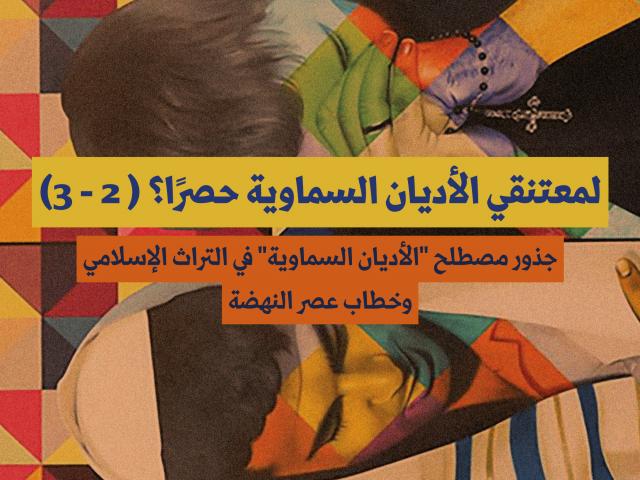
“Exclusively for Adherents of “Divinely Revealed Religions?” EIPR launches the second paper of its study on the roots of the term "divine religions"
Press Release
Today, EIPR released an article titled “Exclusively for Adherents of Divinely Revealed Religions? - The roots of the term "divine religions" in the Islamic heritage and the discourse of the age of renaissance.” The article, written by Mohamd Gamal Ali and edited by Amr Ezzat, is the second of three articles included in the EIPR's lengthy study of the term "divine religions", which refers to the three monotheistic religions: Islam, Christianity, and Judaism.
The study begins from the premise that this term enjoys a pivotal place in many constitutional and legal texts and in judicial rulings and administrative decisions, as well as its media and educational uses as one of the basic constituent elements of public order in Egypt, according to the discourse of the Egyptian legislative and judicial institutions. Hence, this study aims to stand on the origins of reference for this term, and how it attained this central position in the Egyptian legal discourse to the extent that almost no legal or constitutional texts or judicial rulings pertaining to religious issues or religious diversity are devoid of it.
This study is directed primarily at the Egyptian legal elite, including lawyers, judges, and legislators. It invites them to reconsider the constitutional and legal uses of the term "divine religions", and addresses it as a cultural or religious postulate that has moved from the arena of thought, education and media to legal and constitutional texts and judicial rulings, which has led to limiting the scope of religious freedoms to the three religions, while excluding others from the system of rights and freedoms that are constitutionally protected.
The study is divided into three research papers: The first paper, issued by EIPR on June 29, 2022, discusses the preparations for the Egyptian constitutions promulgated in 1923, 2012, and 2014. The paper presents an analysis of the discussions of the members of the committees entrusted with drafting these constitutions on issues of freedom of religion and belief and on the limits of religious freedoms and whether they are limited to the three intended religions. The first paper also presents important arguments for lawyers and judges in response to the judicial rulings that establish the restriction of religious freedoms to affiliates of "divine religions" alone, based on the preparatory works for the 1923 constitution. This is where those judicial rulings provide a reading that lacks evidence from those preparatory works to the effect that the preparatory discussions for the 1923 constitution witnessed an agreement on restricting religious freedoms to the monotheistic religions only. The first paper of this project criticizes this premise and offers a different alternative. The paper also sheds light on how the term monotheistic religions were constitutionalized since the 2012 constitution, followed by the 2014 constitution, and the nature of the discussions and disagreements that took place in those two processes.
The second paper that we publish today discusses the reference and intellectual origins of the term "divine religions” and the roots of this term or its content in the literature of Islamic faith and jurisprudence since the codification era. It also deals with the origins of the term or its content in the discourse of the Nahda (Renaissance) era, which is considered one of the most important sources of the Egyptian national discourse. It questions the extent to which the term "divine religions" is standardized and original, and how it acquired this prevalence in contemporary thought and discourse, including its impact on the exclusion of non-believers in monotheistic religions from the system of religious freedoms. This second paper also questions whether the legal use of the term expresses a continuous and inherited practice from the Islamic jurisprudential and historical heritage based on a similar meaning to the term "people of the book" as some jurists and contemporaries claim. On the other hand, the paper questions the existence of important differences between the terms “divine religions” and “people of the book”, and whether there were other trends in the Islamic heritage - jurisprudence and historical practice - that differ from that exclusionary trend in using the term divine religions adopted by the Egyptian state?
The third paper will present a detailed explanation of the multiple uses of the term divine religions in Egyptian legislation, constitutional texts, and judicial rulings. It will also clarify the increased prevalence of the use of this term at the level of Egyptian legislation, and provide a critique of this term, which is not an objective criterion that can be used constitutionally and legally.



